- Home
- James Carol
The Quiet Man Page 16
The Quiet Man Read online
Page 16
‘Hold up a second,’ Winter said. ‘We need to get clever or we’ll be here all night. I take it you’ve already had someone go through these.’
‘Of course.’
‘And they did exactly what you’re about to do? They started four years ago and worked from there, checking the headlines for the days around August 5 to see if anything jumped out?’
Anderton nodded. ‘That’s right.’
Winter glanced at the volumes of back issues lined up on the shelves, searching for inspiration, searching for ideas. ‘What’s the first difference between then and now?’
‘The fact that we’ve established the killer is targeting the husbands rather than the wives.’
‘Exactly. The dynamic has completely changed. We need to bear that in mind when we’re looking through the back issues.’
Anderton reached up to the shelf again.
‘Wait,’ Winter said.
Her hand froze in midair and she turned to face him.
‘We need to try a different approach,’ he went on. ‘Like Einstein once said, insanity is doing the same thing over and over again and expecting different results. The reason that became a maxim is because it’s true. It’s the curse of large bureaucratic organisations like the Vancouver Police Department. The two of us might be lacking in manpower, but no one will ever accuse us of being a large bureaucratic organisation. I say that we embrace our flexibility.’
‘Okay, so what constitutes a different approach?’
Winter pressed a finger against his lips to shut her up, then closed his eyes. He could sense her frustration. She was champing at the bit, anxious to get going, and he kept pulling her up. He took a couple of deep breaths and tried to clear his mind. Then he thought about Nicholas Sobek and David Hammond and Eric Kirchner, looking for the things that connected and separated them. He thought about the photo composite and the way that the three faces had been blended together to create a brand-new face. One that was similar but different. Black hair, brown eyes, early thirties. The age worked with how the killer was profiling. The hair colour and brown eyes could be taken as read. Without realising it, the killer had told them what he looked like. But what was motivating the crimes? That was the key question here. Winter opened his eyes.
‘Yesterday we were chasing a sadistic killer who got his kicks from making his victims suffer through a nightmare that’s almost impossible to comprehend. What must their last moments have been like? Sitting there waiting for the door to open and knowing that they were going to die? Any rational person would look at that situation and conclude that this guy was a complete sadist. So we fast forward to today and it’s like we’ve woken up on a brave new world. The whole landscape has changed and nothing is as we remember it. For starters, he isn’t a sadist.’
Anderton’s face creased with disbelief. ‘How can you say that? The guy’s a complete psycho.’
‘I agree that he’s a psychopath, but it doesn’t necessarily follow that he’s a sadist. Not all psychopaths are cold-blooded killers. Some are, some aren’t. Psychopaths are wired differently, they think differently. It’s not uncommon for the actual murder to be a secondary consideration. Sometimes it has nothing to do with the fantasy whatsoever. A good example is your first-time rapist. Once he’s played out his fantasy he realises that he’s got a witness that needs to be disposed of, so he disposes of them. The point is that the murder was never really a part of the fantasy. He’s just tying up loose ends.’
‘So, what are you saying? That our guy’s pathologically pragmatic?’
‘That’s exactly what I’m saying. These murders serve a purpose. The question we should be asking ourselves is what that purpose is.’
‘So what purpose do they serve?’
Without another word, Winter shut his eyes and imagined he was the person from the photo composite. Then he stepped into the zone.
*
It’s been a long day and I’ve just got home, weary after spending the day at the office. I push open the kitchen door and the bomb goes off. To start with I’m confused and disoriented, but that eventually gives way to a kind of numb realisation. At some point I’ll work out that there has been an explosion. Slowly, I’ll start piecing things together, but to do that effectively I need more information, and that information is on the other side of the kitchen door. So, I open it again. This time there’s no explosion, but I do get hit with a second wave of confusion when I see my wife lying on the floor taped to a chair. I rush over to help her, only there’s no point. She’s already dead. Confusion slowly gives way to understanding, and that understanding trails nothing but guilt in its wake. In no time that guilt becomes all-consuming, smothering me until I can’t see or hear anything else.
*
Winter opened his eyes and caught Anderton staring.
‘Where do you go to?’ she asked.
‘Do you really want to know?’
She thought this over for a second then shook her head. ‘Not really.’
‘If the husbands are a projection of the killer, who do the wives represent?’
‘Maybe he’s married. That would be the obvious answer.’
‘So, what happened to his wife?’
‘Well, she didn’t die in an explosion. I looked into every explosion that’s happened in the city over the last twenty years. There were six of them. Nine people died in total. No women. Therefore, no wife.’
‘So the way the wives die is symbolic. It doesn’t matter how they die, what’s important is that they’re killed by their husbands.’
‘Except that doesn’t work either. This doesn’t link to any unsolved homicide. That’s another angle I looked at.’
‘But what if it wasn’t a homicide? What if the death was accidental and the killer was somehow responsible? A traffic accident, for example. Maybe he crashed his car and his wife died as a result.’
Anderton looked over at the volumes of back issues. ‘So, we search for accidents involving husbands and wives. And we start by looking four years ago.’
Which again made sense, thought Winter. Because something must have triggered the murders, and that something could well have happened exactly four years ago today. With trigger events, something happened to instigate a new event. Hence the name. You pull the trigger, the gun goes bang. It was cause and effect. For every action there was an equal and opposite reaction, just like Newton worked out three centuries earlier. Anniversaries were common trigger events, and maybe that’s what had happened here. Maybe the killer’s wife had been killed in an accident. A year later, the anniversary getting closer, he snapped and killed Isabella Sobek.
It all made sense.
But.
‘What about Cody?’ Winter asked.
Anderton was moving toward the shelves again, ready to pluck one down. She stopped walking and turned to face him. ‘What about him?’
‘Where does he fit into all of this? The fact that the killer talked to him means that he’s significant. If he wasn’t, then why take that risk? Where’s the upside? But he did talk to him. And before talking to him he stalked him on Facebook. He was specifically targeted.’
‘We’re only assuming that the dog guy is the killer. As far as that goes, all we’ve got is circumstantial evidence.’
‘But if you put all that circumstantial evidence together it starts to look somewhat more substantial. We don’t have to prove any of this in court, remember? That’s Freeman’s job. All we’ve got to do is convince ourselves. And right now, I’m a believer. The dog guy’s the killer.’
Anderton didn’t say anything for a second. Winter could almost see the cogs turning inside her head. ‘If you’re right then this is a major anomaly. On the one hand we’ve got three husbands who killed their wives. On the other we’ve got a ten-year-old kid who killed his mom.’
It was Winter’s turn to fall quiet, his turn for the cogs to start whirring. It was hard to shake the feeling that something obvious was being missed. He pulled out a chair an
d sat down. For almost a minute he didn’t say a word. He was trying to see Cody the way that the killer had seen him. Trying to focus on the wood when there were just too many trees.
‘Is Cody an anomaly?’ he asked. ‘He’s got black hair and brown eyes. That’s two things he has in common with the husbands straight away.’
‘Yes, but he’s more than twenty years younger.’
‘And maybe that’s the whole point. Right now we’re working on the theory that the husbands represent the killer. But what if Cody is representative of him as well? Only a version that’s twenty years younger.’
Anderton opened her mouth but nothing came out. It slowly shut and a thoughtful expression came over her face. Winter wouldn’t blame her if she thought the idea was crazy. Then again, if there was one thing he’d learned it was that crazy came with the territory. The benchmark case was Richard Chase, the Vampire Killer. Chase broke into houses in Sacramento and checked the bathroom soap. His decision to kill was based on whether the bottom was gooey. If it wasn’t then he would move on to another house. He also drank his victims’ blood because he believed that his own was turning to dust. This was the world that Winter inhabited. When you’re dealing with this level of crazy, anything goes.
‘Cody’s ten,’ Anderton said, ‘and the husbands were all in their early thirties when the murders happened. That means we’re looking at the years 1995 through to 1997.’
‘If we get nothing there then we start looking at the years either side.’
‘Sounds like a plan.’
They walked over to the bookshelves. The years they were interested in were three-volume years. August was covered by the middle one. Anderton pulled down the books and Winter carried them to the table. For the whole of its history the Vancouver Sun had been a broadsheet, which made the volumes heavy and unwieldly. They sat down opposite each other and went to work. Anderton took 1995, Winter took 1996.
Because they were interested in what happened on August 5, Winter went straight to August 6. Daily newspapers were always twenty-four hours out of date. The lead for August 6, 1996 was a story about a factory closing down with the loss of two hundred jobs. Losing your job was a top-five trigger event, but Winter couldn’t see how this particular factory closure might fit with this case. He flipped to the next page. He was interested in any stories involving women who were in the twenty-four to fifty-four age group. Statistically speaking, that’s where you were most likely to find a mom with a ten-year-old kid.
He reached the sports pages without finding anything. Just to be thorough, he went through the edition for August 7. If it was a light news day they might well have used something that hadn’t made the cut the previous day. Anderton had moved on to August 7, too. Winter went from cover to cover but nothing jumped out. The book made a solid thump when he closed it. He pushed it to one side and reached for the 1997 volume. Anderton finished with hers a couple of minutes later. She closed it with a bang then went over to the shelves for the 1994 volume.
An hour later they’d covered the whole of the nineties and the tail end of the eighties. Nothing had jumped out. They’d even gone back to the volumes from 1995 through to 1997 and looked at August 8 and August 9, just in case. Still nothing. They leant back in their seats and locked eyes across the table. The only noise was the hum of the air conditioner.
‘Face it, Winter, the date might be arbitrary.’
He shook his head slowly. ‘It has to mean something.’
‘Just because you want something to be true, it doesn’t mean that it is.’ She stopped talking and grinned to herself. ‘You know, that sounds like the sort of bullshit line you’d come out with.’
‘Very funny.’
‘Look, don’t feel bad. It was a good idea.’ She stopped talking again. This time she was thinking rather than grinning. ‘If it makes you feel better, I can call one of my contacts. If she died in a traffic accident then it might not have been a big enough story to make the paper.’
‘If someone had died, it would have been in there, even if it was just a paragraph or two.’
Anderton put her hands up. ‘Hey, I’m just trying to make you feel better.’
‘I appreciate it, but don’t bother. I know how this works. Some ideas pan out, most don’t.’
‘So cynical for one so young. What happened?’
Winter laughed wryly. ‘You want to know what happened? Life happened.’
33
By seven that evening Winter was back in his hotel suite at the Shangri La. The TV was on, the sound muted. It was tuned to Global BC’s news channel. Charlotte Delaney was on the screen. Her lips were moving, but he couldn’t hear a word she was saying, which wasn’t necessarily a bad thing. He poured a generous measure of Springbank and settled down on the sofa. Mozart’s Piano Concerto Number 23 was playing on the room’s sound system. For a while he just sat there with his eyes closed, listening to the music and sipping from his glass. Mozart and a good single malt. Life didn’t get much better. This was his salvation. When the darkness threatened to overwhelm him this was where he came.
He could feel the frustrations creeping in, which was nothing new. Most detective work seemed to involve two sideways steps for every one forward. They’d made progress today, but the killer was still out there. The bottom line: they had thirty-six hours to catch him before the trail went cold. If that happened it would be another year before it turned hot again.
The first movement of the concerto was frenetic and playful, and made Winter itch to play. He didn’t play anywhere near as often as he should these days. His lifestyle didn’t allow for it. Guitars were portable, pianos weren’t. There was a baby grand at his house in Virginia. It was a beautiful instrument. The keys were weighted just right and the tone was incredible. He hadn’t been back there since the execution. At some point during the long drive home from California’s San Quentin prison he’d made the decision to leave the FBI. He’d quit the next day, just packed up his desk, then gone home and packed a suitcase. He’d headed to the airport with no real plan of where he was going or what he might do when he got there. And here he was, still travelling, and still not sure where he might end up next.
The second movement started playing. It was slow and melancholic and as heartrending as anything that Mozart had ever written. The piece reminded him of his mom, but from the days after the arrest rather than the days when she still knew how to smile. After the arrest things had been unbearable for her, yet she’d hung on in there. Winter had often wondered why she hadn’t killed herself.
Her funeral was the loneliest thing he’d ever witnessed. He was the only mourner, and that more than anything else brought home what his father had done to them. An instrumental version of ‘Abide With Me’ was playing through the crappy stereo system when Winter arrived at the chapel. He had traced the music to the source and pulled the plug. This had earned him a strange look from the priest, but he didn’t care. His mother had loved music. There was no way he was subjecting her to this. He hadn’t been able to save her, but at least he could spare her this final indignity.
He could still picture the coffin sitting at the front of the crematorium’s tiny chapel, the sunlight laid across the wood, pink and green and golden, tinted by the cheap stained glass. A priest had gone through the motions, reciting his lines like a bored actor, his performance wooden and lacking any real emotion. And then her body had been consigned to the flames. As soon as the coffin was out of sight, Winter had walked away, the sound of his footsteps following in his wake and echoing in his ears. He hadn’t looked back. There was no point. Whoever or whatever was in that coffin, it wasn’t his mother.
The second movement drifted to a gentle close and he opened his eyes. He drained his glass and poured another inch. Myra Hooper’s murder was still dominating the news. Right now, it was the only story in town. Winter checked his watch. Twenty-three after seven. So far, so good. The killer hadn’t struck again. Not yet, at any rate. The two-hour window between six
and eight was the danger zone. If they lasted through the next thirty-seven minutes they should be okay. ‘Should’ being the operative word. If they’d learned anything from today it was that they couldn’t take anything for granted. Winter felt like he should be doing something, but what? Anderton had felt the same thing, too. In the end they’d decided to call it a day. The best thing they could do was get some rest so they could hit the ground running tomorrow.
The picture on the TV changed and Charlotte Delaney was back. She looked intense. Whatever she was saying, the future of mankind depended on it. The camera cut away and did a slow scan of the area. Winter recognised Spencer Avenue from this morning. There was still a major police presence, but the energy had changed. Earlier, everything had been charged by the newness of the situation. A little under twelve hours on and everyone was starting to get jaded. It was like everything had been dialled down a couple of notches. Cops were still milling around but without the same sense of urgency. The CSI truck didn’t look as though it had moved. The area around the tree where Anderton found the footprint had been cordoned off with crime-scene tape.
Even though it was getting late there was a bigger crowd than earlier. That was to be expected. As soon as the news of a murder got out, people gravitated toward the crime scene. What were they hoping to see? The blood? The body? Because if that was the case then they were going to be sorely disappointed. Those were the first things to get hidden away. Crime-scene tents weren’t just there to protect the evidence. It was the same mindset that encouraged people to try to see into the back of ambulances. Even though they were flying past, siren blaring, lights flashing, you still tried to peer through the dark glass to catch a glimpse of whoever was inside.
Winter still couldn’t shake the feeling that they were close to a breakthrough, and that Cody was somehow the key. Assuming he was the only one who’d been approached by the killer, what made him so special? Why single him out? An updated version of the photo composite had been created from his description, but none of the husbands had recognised this new face. Sobek included. Freeman had sent someone to the cemetery to talk to him. The fact that nobody had recognised the face in the composite was far from conclusive. Eyewitnesses were unreliable at the best of times, and, in the case of Sobek, three years had passed since Isabella was murdered. Most people struggled to remember what they’d eaten for breakfast, never mind something that happened three years ago.

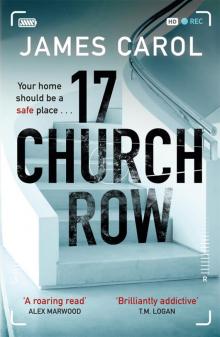 17 Church Row
17 Church Row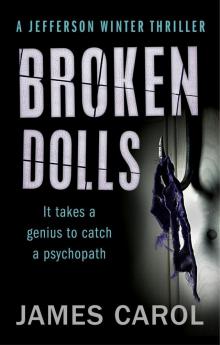 Broken Dolls (A Jefferson Winter Thriller)
Broken Dolls (A Jefferson Winter Thriller)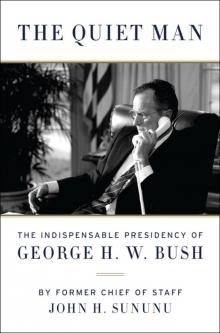 The Quiet Man
The Quiet Man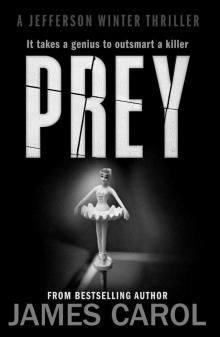 Prey (Jefferson Winter)
Prey (Jefferson Winter)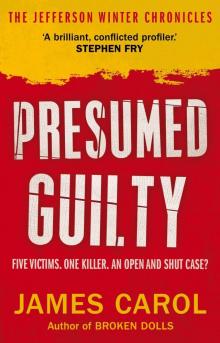 Presumed Guilty: (A Jefferson Winter novella)
Presumed Guilty: (A Jefferson Winter novella) Hush Little Baby
Hush Little Baby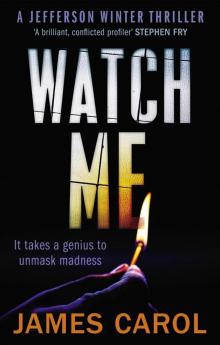 Watch Me (Jefferson Winter 2)
Watch Me (Jefferson Winter 2)